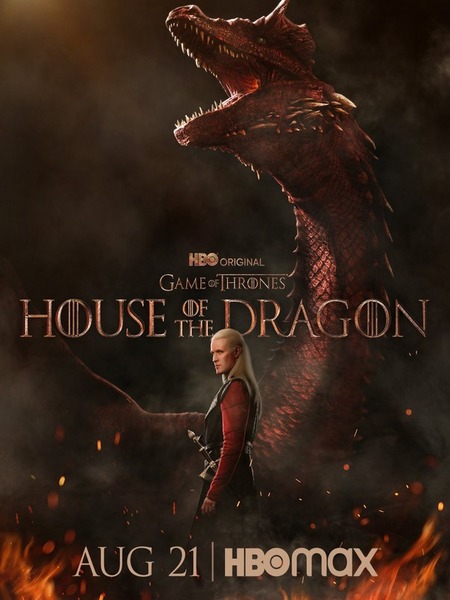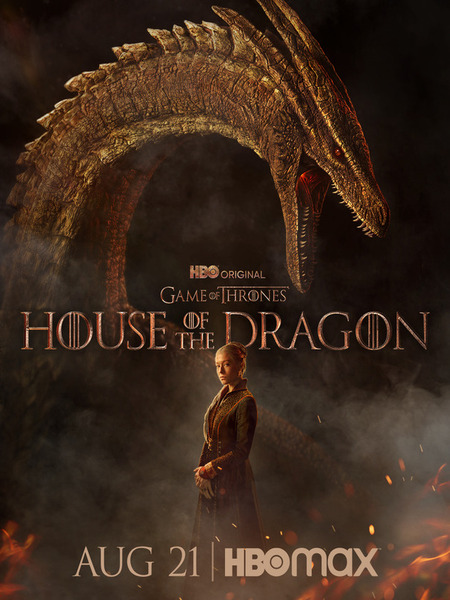SPOILERS AHEAD … AND SOME *BIG* DRAGON MOMENTS …
Power is inherently seductive to quite a lot of people.
Makes sense – you have control, you get to set the course of events and remake whatever small patch of the world falls under your purview in your, hopefully benevolent and wise image (of course, power can also corrupt and then, well, the results are usually not even remotely pretty).
But as the final four episodes of the first season of House of the Dragon show all too dramatically, and with some crushingly intense emotionality at times, getting the image may involve more cost than it is worth.
Not that you really see anyone, apart from a wavering Rhaenyra Targaryen (Emma D’Arcy) who wonders at one crucial juncture if she would be better withdrawing from a power grab after the throne is usurped from under her (not literally because hovering over the Iron Throne would not be comfy), questioning whether that maneuvering for power is worth it.
In fact, even as you watch people suffering in countless big and small ways through the final four dramatic storylines all for the sake of power, it becomes clear that many people, even an initially morally doubtful Queen (Olivia Cooke) who quickly elbows aside any qualms because POWER, have no doubt that getting all that control over peoples’ destinies, is absolutely worth it.
As an exercise in the dynamics and how it warps and corrupts even the best among us, House of the Dragon has shown itself to be even more ruthless and brutalist than Game of Thrones, with the scariest thing about it not being the threat of instant dragon-assisted immolation but how manipulatively awful can be to each other, even family and onetime friends, if it means they get to call the shots.
In a country as big and sprawling as the Seven Kingdoms of Westeros, that’s a lot of shots indeed, and it hardly surprising that the jockeying between the Queen’s camp, where Prince Aegon II Targaryen (Tom Glynn-Carney) is the heir apparent, and that of Rhaenyra who has been officially named to succeed an ailing King Viserys I Targaryen (Paddy Considine) and who is opposed by an array of usually misogynistically conservative figures, gets s down and dirty as it does.
What is shocking, and House of the Dragon does not hold back even a little here – save for the moment when a pissed-off Princess Rhaenys Targaryen (Eve Best) does not incinerate the Queen and her treasonous sons, leaving them alive knowing she opposes them and will continue to do so – is the depths and lengths that people will go to get and hold onto that power.
The main thrust of these four episodes is the succession to a new ruler in Westeros after King Viserys finally shuffles off this mortal coil after a lengthy period of illness that has left him bedridden and drugged-up to the point of near-insensibility.
With Rhaenyra far away in Dragonstone with the Machiavellian nastiness that is her uncle and, cough cough, husband Prince Daemon Targaryen (Matt Smith), still embroiled in gossip around the illegitimacy of her sons who are not biologically from House Valerayon, whatever their names may say, the Queen, and the Green Council, who are essentially a ruling group of people that includes the King’s Hand aka 2IC who – warning warning conflict of interest! – the Queens’ dad, Ser Otto Hightower (Rhys Ifans), move FAST.
Scarily, bloodthirstily fast.
In no time flat, all of the servants who know about the King’s death are locked away (and who know, likely killed?), any dissenting Lords of the Realm who won’t bow down to Eagon as a hastily-installed King are summarily killed – they had all sworn allegiance to Rhaenyra (who is crowned Queen by her supporters who will not let the Aegon’s conniving mother get away with her treachery) but most seeing the writing on the wall and recant save for a few with moral backbones – and the throne is briskly usurped, so fast in fact that the public of King’s Landing have to be pushed to the crowning ceremony, unaware that’s why they are there.
It’s a brilliant bit of powerplaying but by the Mother, it’s darkly, horrifically brutal and there are times, if you have a beating heart and a caring soul, that you will wince at how far some people will go to get what they want.
Oh, they might talk about the nobleness of serving the subjects of Westeros or of holding years of tradition, and they make it all sound so good and holy and beyond reproach, but it’s grubby, slimy, down in the trenches power mongering and very few emerge from these four episodes looking anything other than avaricious opportunists.
At the end of the blood-soaked day, House of the Dragon is a gripping deep dive into the very darkest parts of the collective soul.
We might talk about doing the right thing and only seeking to ennoble and edify others but far too many of us, at least in Westeros which, medieval trappings aside, do not even remotely walk that talk.
The result is power and the lives of countless innocent, and granted not so innocent people, being traded like macabre trading cards, trophies to be held aloft as proof of some sense worth and entitlement as human beings.
The truth is though that whatever self delusion people may employ, and the characters in House of the Dragon go above and beyond to bolster theirs, they are all nothing but ruinous traders of power at its most basically destructive, and the costs and dubious gains are laid out in a gripping story that makes for an instructive lesson in what may befall us if we lose sight of all that good and decent.
Whatever moral qualms you may have about the people in House of the Dragon, their machinations make for some utterly compelling and fantastically immersive television, so compelling in fact that even as you blanch at their moral depravity, or their response to its exercise, you cannot stop watching.
Whatever your feelings about this Game of Thrones prequel-sequel – some feel it’s too much of a retread, others that it has a life (or death) of its own; this reviewer sits somewhere in-between entranced by the characters but feeling like he’s seen it all before – it is enthrallingly goo and starkly emotionally resonant storytelling that knows how bleak and power hungry the human soul can get and which is more than happy to make the absolute most of it, to the great viewing benefit of its audience.
Now that season 1 has, in the words of co-creator, Ryan Condal, “flipped the chessboard over and spilled the pieces on the ground”, expect way more big, expansive storytelling to come in season 2 which is due to drop at an unspecified point in the future.

